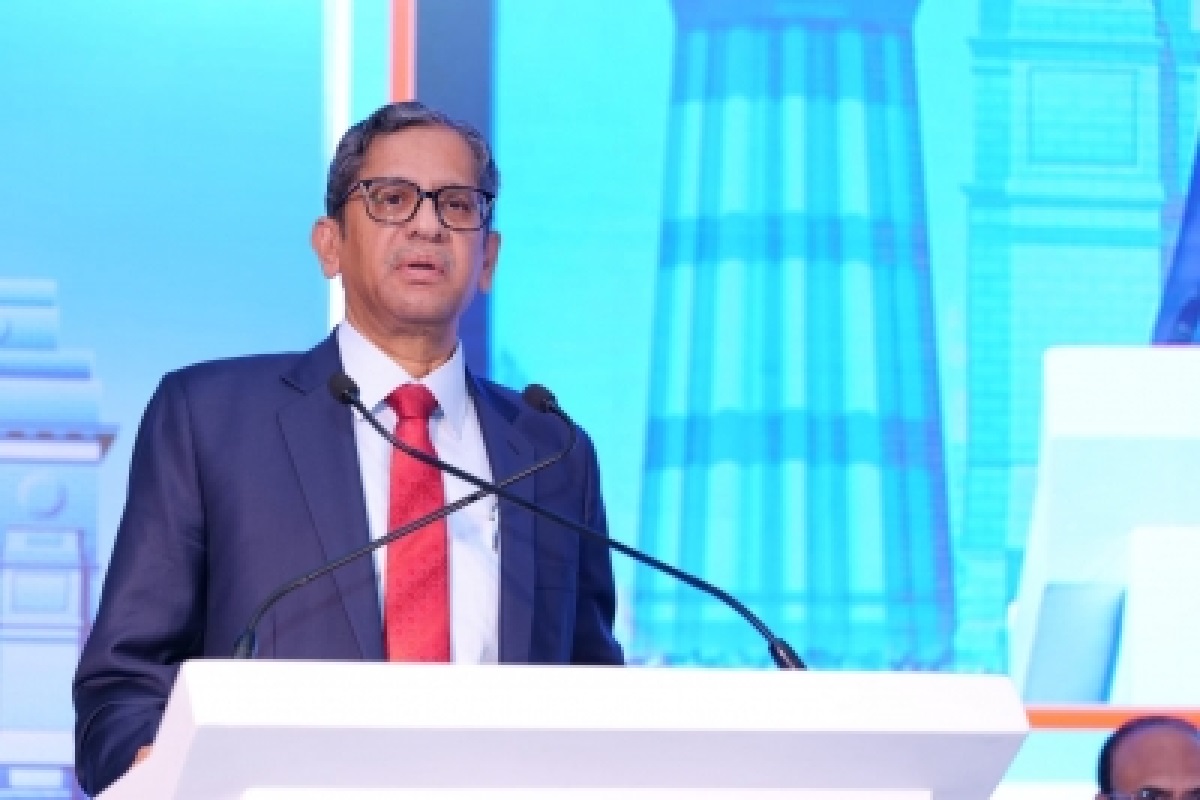Addressing the 11th Joint Conference of Chief Justices of various High Courts and Chief Ministers of States, the Chief Justice of India (CJI) N V Ramana today said that more than 40 million cases were pending in lower courts, highlighting a huge backlog of cases in the legal system.
“In 2016, the sanctioned strength of judicial officers in the country was 20,811. Now, it is 24,112, which is an increase of 16% in 6 years. On the other hand, in the corresponding period, pendency in district courts has gone up from 2 crore 65 lakhs to 4 crore 11 lakhs, which is an increase of 54.64%. This data shows how inadequate the increase in the sanctioned strength is,” the CJI Ramana said.
He also said that we have 20 judges per million population, which is highly inadequate to deal with the rising trend of litigation. He said this today at Vigyan Bhawan in New Delhi, while addressing the Joint Conference of Chief Justices of various High Courts and Chief Ministers of States.
As on today, out of 1104 sanctioned posts of High Court Judges, there are 388 vacancies. From day one, it has been my endeavour to fill judicial vacancies. We have made 180 recommendations, for appointments in various High Courts during the last year. Out of this, 126 appointments have been made, the CJI Ramana said.
He, however, pointed out that 50 proposals are still awaiting approval by the Government of India. The High Courts have sent around 100 names to the Government of India. They are yet to reach us. The data reveals the earnest efforts being made by the judiciary to fill the vacancies.
The CJI Ramana said that we all must not cross Lakshman Rekha while discharging out duties.
“While discharging our duties, we all must be mindful of the Lakshman Rekha. The judiciary would never come in the way of governance if it is in accordance with law. We share your anxiety and concern regarding the welfare of the people,” the CJI Ramana said.
On this occasion, the CJI also urged the Chief Ministers to extend wholehearted co-operation to the Chief Justices, in their endeavour to strengthen the district judiciary.
Unless the foundation is strong, the structure cannot be sustained, he said and requested the Centre to be generous in creating more posts and filling the same, so that our judge-to-population ratio is comparable to advanced democracies.
“As per sanctioned strength, we have just around 20 judges per 10 lakh population, which is alarming low,” he said.
The 140-crore strong population of the world’s largest democracy is bound to test its judiciary. No other constitutional court in the world hears such a wide range of issues in such large numbers, he said.
“It is a well-acknowledged fact that the governments are the biggest litigants accounting for nearly 50% of the cases. If police investigations are fair, if illegal arrests and custodial torture come to an end, then no victim will have to approach the courts,” the CJI said, the CJI Ramana said and added that abiding by law and the constitution, is the key to good governance. However, this is often ignored, and opinions of legal departments are not sought in the rush to implement executive decisions.
He also said that lack of special prosecutors and standing counsels is one of the major issues that needs to be addressed.
The decisions of courts are not implemented by Governments for years together. The resultant contempt petitions are a new category of burden on the Courts, which is a direct result of the defiance by the Governments. Deliberate inactions by the Governments, despite judicial pronouncements, are not good for the health of democracy, he said.
The judiciary is also confronted with the issue of the executive willingly transferring the burden of decision making to it. Although policy making is not our domain, if a citizen comes to the court with a prayer to address his grievance, the courts cannot say no, the CJI Ramana said.
While addressing the gathering, India’s Prime Minister, Mr Narendra Modi, assured that governments, both at Centre and states, would provide all possible assistance to judiciary to enable it ensure speedy justice to all.
He requested the CMs and CJs to examine cases of nearly 3.5 lakh undertrial prisoners across India, who have been incarcerated for long, and see whether they could be released on bail.
Mr Modi said deliberations in this conference will help laying the path for judiciary to give common citizens speedy and time-bound justice.
Addressing the Joint Conference of Chief Ministers of States and Chief Justices of High Courts, the CJI Ramana stated that the Judiciary, Executive, and Legislature must work together to tackle India’s judicial pendency problem.
The Prime Minister, Law Minister, along with Supreme Court’s many judges, and many other dignitaries also attended the conference, today, besides the CJI, along with the Chief Ministers of various states, Chief Justices of all High Courts, and many Supreme Court Judges.
The CJI Ramana said that it was incorrect to solely blame Judges for rising pendency. Examining the causes for the Court’s expending docket, he urged the government to fulfil its responsibilities such that citizens are not forced to approach the Court for every problem.












